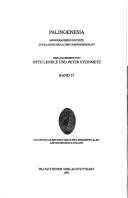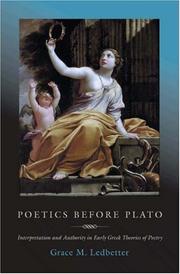| Listing 1 - 5 of 5 |
Sort by
|

ISBN: 9783515058025 3515058028 Year: 1991 Publisher: Stuttgart: Steiner,
Abstract | Keywords | Export | Availability | Bookmark
 Loading...
Loading...Choose an application
- Reference Manager
- EndNote
- RefWorks (Direct export to RefWorks)
Dissertation
Year: 1895 Publisher: Gottingae : In aedibus Dieterichianis (L. Horstmann),
Abstract | Keywords | Export | Availability | Bookmark
 Loading...
Loading...Choose an application
- Reference Manager
- EndNote
- RefWorks (Direct export to RefWorks)
Book
ISBN: 3515075178 9783515075176 Year: 1999 Volume: 1999(4) Publisher: Mainz: Akademie der Wissenschaften und der Literatur,
Abstract | Keywords | Export | Availability | Bookmark
 Loading...
Loading...Choose an application
- Reference Manager
- EndNote
- RefWorks (Direct export to RefWorks)
Plato --- Plato. --- Plato - Hippias major
Book
ISBN: 1282645048 9786612645044 1400835062 0691128561 0691163421 9780691163420 9781400835065 9781282645042 9780691128566 Year: 2010 Publisher: Princeton, NJ
Abstract | Keywords | Export | Availability | Bookmark
 Loading...
Loading...Choose an application
- Reference Manager
- EndNote
- RefWorks (Direct export to RefWorks)
In recent years, most political theorists have agreed that shame shouldn't play any role in democratic politics because it threatens the mutual respect necessary for participation and deliberation. But Christina Tarnopolsky argues that not every kind of shame hurts democracy. In fact, she makes a powerful case that there is a form of shame essential to any critical, moderate, and self-reflexive democratic practice. Through a careful study of Plato's Gorgias, Tarnopolsky shows that contemporary conceptions of shame are far too narrow. For Plato, three kinds of shame and shaming practices were possible in democracies, and only one of these is similar to the form condemned by contemporary thinkers. Following Plato, Tarnopolsky develops an account of a different kind of shame, which she calls "respectful shame." This practice involves the painful but beneficial shaming of one's fellow citizens as part of the ongoing process of collective deliberation. And, as Tarnopolsky argues, this type of shame is just as important to contemporary democracy as it was to its ancient form. Tarnopolsky also challenges the view that the Gorgias inaugurates the problematic oppositions between emotion and reason, and rhetoric and philosophy. Instead, she shows that, for Plato, rationality and emotion belong together, and she argues that political science and democratic theory are impoverished when they relegate the study of emotions such as shame to other disciplines.
Democracy - Philosophy. --- Democracy -- Philosophy. --- Plato. --- Plato. Gorgias. --- Shame - Political aspects. --- Shame -- Political aspects. --- Shame --- Democracy --- Philosophy --- Philosophy & Religion --- Political aspects --- Political aspects. --- Philosophy. --- Emotions --- Guilt --- Ad hominem. --- Allan Bloom. --- Ambiguity. --- Ambivalence. --- Anger. --- Aristotle. --- Athenian Democracy. --- Bernard Williams. --- Callicles. --- Catamite. --- Charmides (dialogue). --- Child abuse. --- Civility. --- Conflation. --- Controversy. --- Criticism. --- Critique. --- Crito. --- Deliberation. --- Demagogue. --- Dialectic. --- Dichotomy. --- Direction of fit. --- Disgust. --- Disposition. --- Distrust. --- Elitism. --- Embarrassment. --- False-consensus effect. --- Forensic rhetoric. --- Form of life (philosophy). --- Freedom of speech. --- Gorgias (dialogue). --- Gorgias. --- Grandiosity. --- Gregory Vlastos. --- Hannah Arendt. --- Hedonism. --- Hippias Major. --- Human Rights Watch. --- Humiliation. --- Ideology. --- Inference. --- Irony. --- Jon Elster. --- McGill University. --- Morality. --- Multitude. --- Myth. --- Nicomachean Ethics. --- Omnipotence. --- On the Soul. --- Ostracism. --- Pathos. --- Perversion. --- Phaedo. --- Phaedrus (dialogue). --- Phenomenon. --- Philosopher. --- Pity. --- Pleonexia. --- Political philosophy. --- Politics. --- Polus. --- Prejudice. --- Princeton University Press. --- Protagoras. --- Psychoanalysis. --- Psychotherapy. --- Public sphere. --- Pythagoreanism. --- Rationality. --- Reason. --- Reintegrative shaming. --- Republic (Plato). --- Result. --- Rhetoric. --- Self-criticism. --- Self-deception. --- Self-esteem. --- Self-image. --- Shame. --- Social stigma. --- Socratic (Community). --- Socratic method. --- Socratic. --- Sophism. --- Sophist. --- Suffering. --- Suggestion. --- Symposium (Plato). --- The Philosopher. --- Theory. --- Thought. --- Thrasymachus. --- Uncertainty. --- Vlastos. --- Vulnerability.

ISBN: 0691096090 9786612087646 1282087649 1400825288 9781400825288 9780691096094 9781282087644 Year: 2003 Publisher: Princeton, N.J. : Princeton University Press,
Abstract | Keywords | Export | Availability | Bookmark
 Loading...
Loading...Choose an application
- Reference Manager
- EndNote
- RefWorks (Direct export to RefWorks)
Combining literary and philosophical analysis, this study defends an utterly innovative reading of the early history of poetics. It is the first to argue that there is a distinctively Socratic view of poetry and the first to connect the Socratic view of poetry with earlier literary tradition. Literary theory is usually said to begin with Plato's famous critique of poetry in the Republic. Grace Ledbetter challenges this entrenched assumption by arguing that Plato's earlier dialogues Ion, Protagoras, and Apology introduce a distinctively Socratic theory of poetry that responds polemically to traditional poets as rival theorists. Ledbetter tracks the sources of this Socratic response by introducing separate readings of the poetics implicit in the poetry of Homer, Hesiod, and Pindar. Examining these poets' theories from a new angle that uncovers their literary, rhetorical, and political aims, she demonstrates their decisive influence on Socratic thinking about poetry. The Socratic poetics Ledbetter elucidates focuses not on censorship, but on the interpretation of poetry as a source of moral wisdom. This philosophical approach to interpreting poetry stands at odds with the poets' own theories--and with the Sophists' treatment of poetry. Unlike the Republic's focus on exposing and banishing poetry's irrational and unavoidably corrupting influence, Socrates' theory includes poetry as subject matter for philosophical inquiry within an examined life. Reaching back into what has too long been considered literary theory's prehistory, Ledbetter advances arguments that will redefine how classicists, philosophers, and literary theorists think about Plato's poetics.
Aesthetics, Ancient --- Authority in literature --- Greek poetry --- -Poetics --- -Poetry --- Greek literature --- History and criticism --- -Theory, etc --- History --- -Technique --- Authority in literature. --- Aesthetics, Ancient. --- Poetics --- Theory, etc. --- History and criticism&delete& --- Theory, etc --- Greek poetry - History and criticism - Theory, etc. --- Poetics - History - To 1500. --- A Preface to Paradise Lost. --- Against the Sophists. --- Allegory. --- Ambiguity. --- Archilochus. --- Biographical criticism. --- Concept. --- Counterexample. --- Criticism. --- Crito. --- Demodocus (Odyssey character). --- Didacticism. --- Dogma. --- Eloquence. --- Epic poetry. --- Euthyphro (prophet). --- Explanation. --- Falsity. --- Fiction. --- Fifth-century Athens. --- G. (novel). --- Generosity. --- Genre. --- Hermeneutics. --- Hesiod. --- Hippias Major. --- Hippias. --- Homer. --- Homeric scholarship. --- Iliad. --- Imagery. --- Inference. --- Iris Murdoch. --- Irony. --- Knowledge. --- Literary criticism. --- Literary fiction. --- Literary theory. --- Literature. --- Metaphor. --- Mimesis. --- Moral authority. --- Morality. --- Muse. --- Narrative. --- New Criticism. --- Notion (ancient city). --- Odes (Horace). --- Odysseus' scar (Auerbach). --- Odysseus. --- Oracle. --- Peleus. --- Phemius. --- Philosopher. --- Philosophy and literature. --- Philosophy. --- Pindar. --- Plato. --- Platonism. --- Poet. --- Poetic tradition. --- Poetics (Aristotle). --- Poetics. --- Poetry. --- Political poetry. --- Post-structuralism. --- Principle of charity. --- Prodicus. --- Protagoras. --- Reason. --- Relativism. --- Rhapsode. --- Rhetoric. --- S. (Dorst novel). --- Satire. --- Skepticism. --- Socrate. --- Socratic method. --- Socratic. --- Sophist. --- Storytelling. --- Suggestion. --- Superiority (short story). --- Supplication. --- Swarthmore College. --- Symptom. --- Telemachus. --- The Death of the Author. --- Theogony. --- Theory of Forms. --- Theory. --- Thought. --- Trojan War. --- Uncertainty. --- Veracity (Mark Lavorato novel). --- Verisimilitude (fiction). --- Verisimilitude. --- William Shakespeare. --- Works and Days. --- Xenophanes.
| Listing 1 - 5 of 5 |
Sort by
|

 Search
Search Feedback
Feedback About UniCat
About UniCat  Help
Help News
News